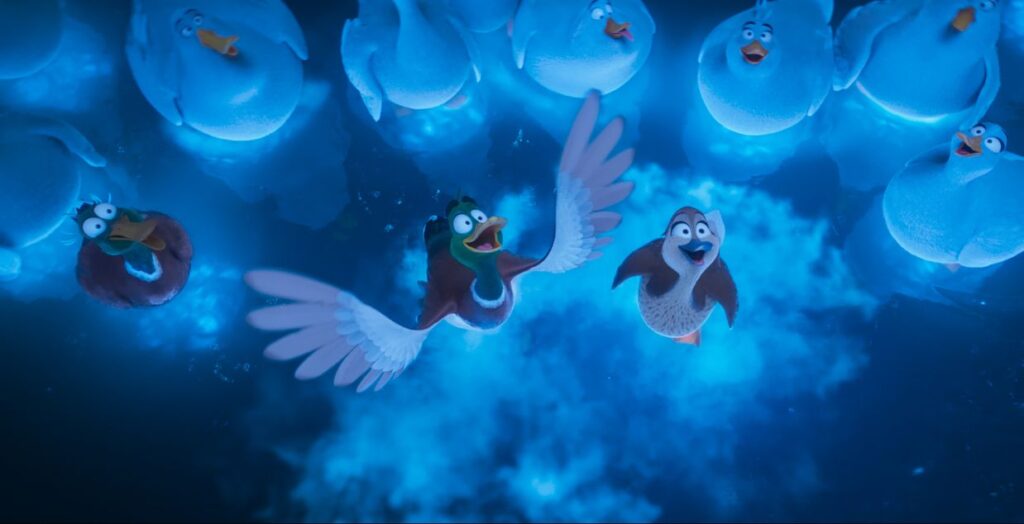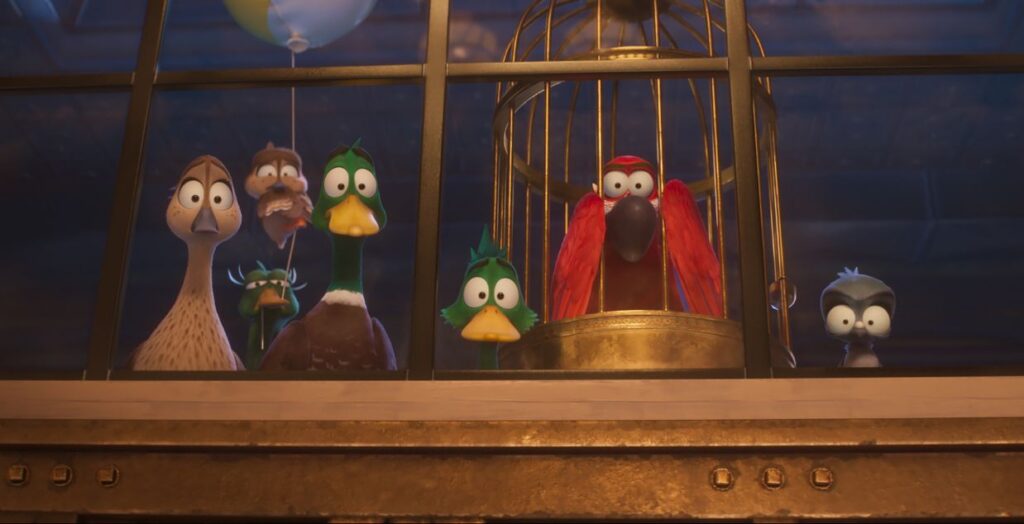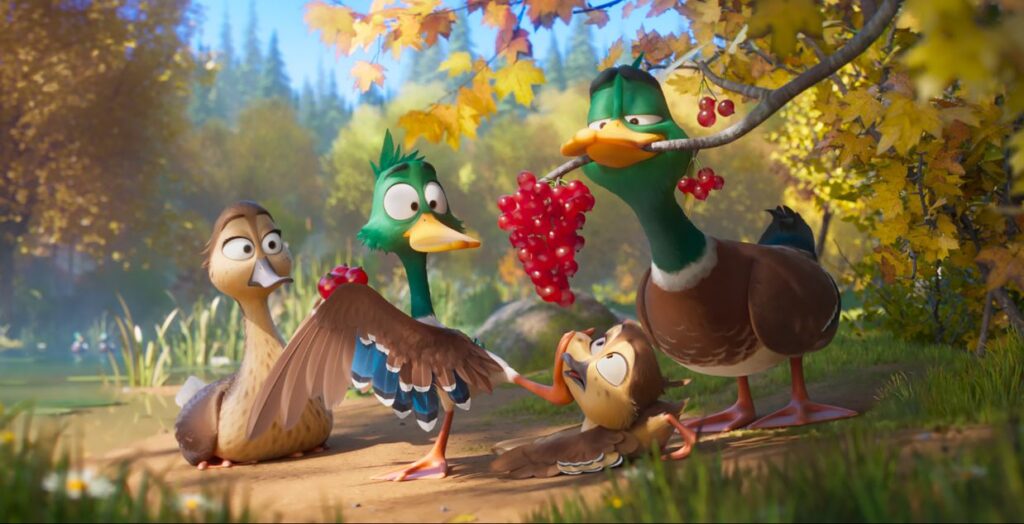It can be easy to write off an animated film’s shortcomings because of its intended audience. It’s a sentiment many studios bank on, hoping crisp, glossy animation will distract from the cliched and cursory stories they rely on. Yet, the movies that leave the biggest impact on young viewers weave authenticity and sincerity into their seemingly simple tales, unafraid to challenge them with intense, even troubling emotions and characters. Illumination’s most recent effort, Migration, represents both a step forward and a significant step back for the animation house in this respect.
Its narrative, about embracing and relishing the unknown, is a timely, necessary lesson for kids but is diluted at every turn by an over-insistence on caricature rather than character. The result is one of the most forgettable animated films in recent years, one whose relevance and impact are tied to the attention span of children it repeatedly fails to instill a sense of wonder.
The script, penned by Mike White, centers on the Mallard family, a quartet of ducks that find themselves more restless than ever. The patriarch, Mack (Kumail Nanjiani), holds fear to be an asset, a state of mind protecting his family from leaving their homely pond and becoming easy prey to a host of predators. It’s a mindset that clashes with his wife Pam (Elizabeth Banks), who wants their kids—Dax (Caspar Jennings) and duckling daughter Gwen (Tresi Gazal)— to experience what the world has to offer. It’s a conflict that’s vibrantly rendered in a hand-drawn opening, a sequence bustling with a sense of personality and ruggedness that’s sorely lacking in the adventure that follows.

After a migrating flock descends on their pond, with exciting tales of far-flung lands, Pam convinces Mack to embark on a family trip to Jamaica. They quickly persuade Uncle Dan (Danny Devito) to tag along, making their way south for the winter on a trail full of wonder and danger.
Migration is an amalgamation of tropes and arcs the studio—and the industry as a whole—has already rifled through, driven by a desire to be easily digestible and palatable. In prioritizing the most familiar and recycled elements of this story, director Benjamin Renner smooths down the exact edges this adventure so desperately needs to immerse and, ultimately, stay with its audience. While not lacking a visual punch, as to be expected in an Illumination effort, there’s a noticeable lack of bite for a film that believes it’s readying children to take on the big, wide, and weird world.
There’s a remarkable balance between levity and gravity that an Iron Giant, Toy Story, or Spirited Away navigate, which lends them a deeply relatable, hidden form of depth—at times resonating even more with the adults bringing their children to the theatre. But Migration actively resists such a thematic and narrative dichotomy. Instead, It manifests as a derivative story anchored by derivative characters. The kind of anthropomorphic animals we’ve seen countless times before, the sum of affectations and quirks rather than earned arcs.
Gwen serves as the film’s contractually obligated cute mascot, a character who exists to sell plushies and dolls that are bound to outlive the memory of the film itself. Migration is full of characters like this, who are all defined by a single trait that’s never built upon, whether it be Mack’s fear of the outside world or Pam’s zest for life. The most egregious of which is Delroy (Keegan-Michael Key), a homesick parrot whose heavy Jamaican accent is made to be his entire identity.

Though it’s not all unremarkable, Devito is funny as ever as the senile, curmudgeonly Uncle Dan whose ambivalence to the greatest dangers lends a wry timbre to a film that’s too often embroiled in a relentless stream of slapstick comedy. Carol Kane also shines in a small role as a carnivorous Heron who invites the family to stay the night in her swampy abode. Though there are some hints at vigour and flavour, it’s obvious that Migration is more interested in mascots than characters, figures who will easily assimilate into Illumination’s overly polished and plasticky horde of intellectual property.
It’s a chief reason why Migration feels soulless. It’s all too easy on the eyes, full of bulbous, homogenous landscapes that look and sound more like empty arenas than bustling lived-in environments. There’s a lack of grit and imperfection in the adventure, especially in its darker moments. While certain segments are undeniably beautiful to look at, especially when the Mallard Clan soars above the clouds and into a treacherous urban locale, there’s a tangibility, fluidity, and expressiveness that’s sorely missing in its approach to character and environment design.
Though Migration is Illumination’s first original concept since 2016’s Sing, it’s anything but. Its story about facing the unknown unfolds as a cruel irony—preaching the importance of escaping one’s comfort zone while strictly adhering to a safe and tired narrative formula. Its magic fades all too easily, as it’s destined to become less of a film and more of a tool used to help parents distract their fussy toddlers.
Migration is available now on VOD.
Migration
-
Rating - 4.5/104.5/10
TL;DR
Though Migration is Illumination’s first original concept since 2016’s Sing, it’s anything but. Its story about facing the unknown unfolds as a cruel irony—preaching the importance of escaping one’s comfort zone while strictly adhering to a safe and tired narrative formula.







